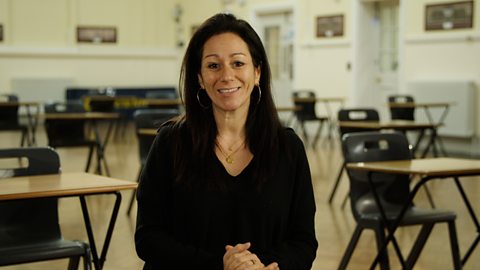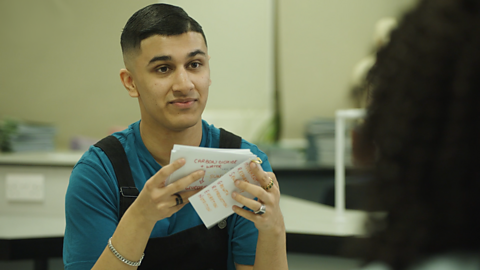This article was last updated on 9 May 2023.
Exam season is a long road full of twists, turns, highs and lows. One minute you can feel on top of the world, the next you may feel swamped in mind-melting past papers – stressful! Our Mind Set coaches have been through it all before, we've asked them for some of their top pieces of advice on how to keep motivated and stay resilient during Nationals and GCSE exam season.
Watch our short video, and then scroll down for more tips from Paralympian, and Strictly star, Ellie Simmonds, which may just help you at a time of need.
Video: Being resilient
Shay It's really important to remember that there is an end to the exams. You definitely can do it.
Dr Colton Whether you're studying for your exams, trying to get into university or applying for jobs, it's important to understand that you might have setbacks along the way. This doesn't mean being negative about your prospects, just accepting that you can't control everything.
Rohan When I get feedback from my teachers, I just remember that they're trying to better me so I can get a better grade for my exams. Don't take it personally if it's not always positive.
Shay I think feedback from teachers is really important. At the end of the day, it's their job to make sure you can pass the exam. Listen to what they say. Don't take it too personally and make sure you can apply it to the questions next time.
Dr Colton A setback doesn't define you. Use the feedback to help you understand any errors or misconceptions and then clear them up. Whatever happens, don't panic. They'll be an option for you, even if it's not the exact one you were working towards.
Jacintha GCSEs were a huge learning curve. You learn a lot more about your character, how determined you are and where your values lie in terms of academic success. When you come out the other end of GCSEs, you're going to be a lot more resilient and have a lot more clarity about what you want to do with your life.
Josh Resilience is an essential quality in life, even when you come across things you don't know or an exam doesn't go as you intended. Believe in yourself and keep going.
Lauren I really try to stay as positive as possible, so what I did was I wrote down five things that I enjoyed in the day or that I was just really happy for. Just before I went to bed. It just put everything else into perspective.
Joe One thing I did when I was getting really low is watch motivational videos online, and it would make me want to do the work.
RohanWhen it comes to my positive affirmations, I like to say things out loud, such as "I'm going to pass my exams, I'm going to do well", and it just keeps you motivated to get you through these exams.
Josh Don't forget to celebrate the little wins. Give yourself rewards, such as watching an episode of your favourite boxset.
Dr Colton Just remember the most successful people are often those who've had setbacks.
Lauren Anytime your teacher says you've not got something quite right, all they want you to do is get the best grades you can. You've got time to make them little tweaks before you go into your exam, that's what we do mocks for. That's why we do practise questions.
Dr Colton It's essential to look after yourself. Staying connected to your friends and family is really important. Meet friends for a walk or even just to chat on the phone. Staying connected with people you enjoy being with helps prevent you from getting lost in your thoughts and worries.
Josh Nobody can stay positive all the time, and that's OK. Remember, that feelings don't equate to facts. The best thing you can do when you experience a negative thought is to check it out. Look for truth and be open to see how it's possible that your thoughts may not be accurate. It could be really helpful to chat to a friend, teacher or parent and get another perspective on things.
Dr Colton During your GCSEs or nationals, you'll get loads of feedback, good and bad. How you deal with the negative feedback is really important. Try and use it constructively and don't dwell on the setbacks, but celebrate the positives. It's great advice for life, not just for now.
Our coaches on being resilient

Getting feedback when you're revising for your GCSEs or Nationals can sometimes feel de-motivating, but our Mind Set expert, Dr Anna Colton, says, "A setback doesn't define you. Use the feedback to help you understand any errors or misconceptions and then clear them up. Whatever happens, don’t panic, there will be an option for you – even if it’s not the exact one you were working towards." When Rohan got feedback from his teachers, he just tried to remember that his teachers were trying to better him so that he could get a better grade for his exams. He says that if your feedback isn't always positive, try to not take it personally. Shay thinks that feedback from teachers is really important. He says to listen to what they say and apply it to the questions the next time you do an exam.
If you want to learn how past papers can help you smash your exams, this guide is the place to go!
As this series title suggests, having a positive 'Mind Set' can really help with your GCSE and Nationals revision. Lauren would try to stay as positive as possible to keep her going during her GCSE revision. She would write down five things that would make her happy just before she went to bed – this helped her to put everything else into perspective. Anxiety Josh says not to forget to celebrate the little wins when revising for your GCSEs or Nationals, and to make sure you reward yourself by doing things you enjoy, like watching your favourite box set. One thing Joe did when he was getting really low was to watch motivational videos online – this made him want to do the work.
For more amazing advice and top tips on how to boost your resilience whilst studying, check out this guide.

Resilience advice from Ellie Simmonds
Team GB Paralympian, Ellie Simmonds, knows all about how to stay resilient – here’s some things she’s learned along the way!
Ellie Simmonds Hello, I'm Ellie Simmonds, a British Paralympic swimmer. A message I'll say to my sixteen year old self is: use that support system around you - Your parents, your coach, your team mates, your friends. For me, I was having to manage training for London 2012 Paralympics with taking my GCSES, doing those exams, having to train, go abroad on training camps and do my GCSEs at international schools. It was a lot of pressure on my shoulders and at that time I thought I could cope with it.
I'm very lucky that my personality is… I'm very time management, very organised, very much love to be in control and sometimes that's important. Yes, that's good but also being aware that you can use other people to help you and especially other team mates who are a lot older, friends, family. They've all been through it before and using that to help you and have that support network is really, really important.
What is The Mind Set?
The Mind Set is two things: a series of films to help support you through your GCSEs and Nationals and a group of amazing young coaches who appear in the films.
Our coaches have been through their GCSEs or National Qualifications already. They come from all different backgrounds and all corners of the UK and they’ve all faced different challenges in getting to grips with exam revision. What they’ve got in common is that they all have heaps of exam revision tips, advice, helpful hints, hacks and wonderful words of wisdom they want to share with you.
In the series, we also hear advice from mental health professionals like Josh Fletcher (AKA “Anxiety Josh”) on how to look after your wellbeing and stay resilient during revision and exams season and we have top revision hacks from our very own memory expert, Dr Vanessa Loaiza!
Explore the Bitesize Study Support pages for more information and revision support.
This article was last updated on 12 October 2023.
If you need support
You should always tell someone about the things you’re worried about. You can tell a friend, parent, guardian, teacher or another trusted adult. If you're struggling with your mental health, going to your GP can be a good place to start to find help. Your GP can let you know what support is available to you, suggest different types of treatment and offer regular check-ups to see how you’re doing.
If you’re in need of in-the-moment support you can contact Childline, where you can speak to a counsellor. Their lines are open 24 hours a day, 7 days a week.
There are more links to helpful organisations on BBC Action Line.
More like this
Revision: How to keep calm
Advice on how to stay calm whilst revising.

Revision: Top revision tips
Smart revision advice from those who've been there.

Revision: Memory hacks and tips
Memory hacks and tips from our coaches to help you with revision.
